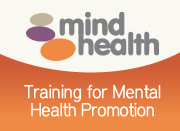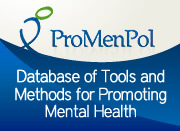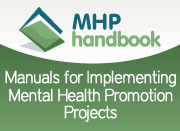The ENMHP are about to offer a new service to members and non-members – Webinars on Mental Health Promotion (MHP) and related topics.
It has become clear that there is a real demand for support in relation to MHP implementation. Remote training needs to be supplemented by a more personal approach and webinars offer a potential solution in that regard.
The European Network for Mental Health Promotion (ENMHP) would like to assess its audience's level of interest in taking part in webinars. If you could complete our questionnaire, it will help us to design webinars that will meet your needs to the maximum extent possible.
All responses to the questions will be treated confidentially. The questionnaire should take about 10 minutes to complete.
Please complete the questionnaire by November the 16th.
If you have any queries about this questionnaire, please contact the ENMHP Secretariat Isabelle Jeffares at i[dot]jeffares[at]wrc-research.ie
Start the Survey
What is a Webinar?
A webinar is a new web-based method for delivering seminars remotely. A webinar has the following features:
-
Real-time interaction
-
Structured or semi-structure presentations
-
Direct audio and video links to the presenter
-
Real time questions and answers
-
Chaired discussion forums
Generally, they involve between 10 and 40 participants (there is a limit on how many can participate) and last for 60 minutes.
The requirements on participants are:
-
Access to the Internet
-
Use of headphones and microphone
Your Trainers
Your Webinar trainers are made up of an experienced team of authorities in the field of mental health promotion and include:
Dr. Richard Wynne, Work Research Centre, lectures in workplace health promotion in University College Dublin. He has been involved in training for workplace health promotion for 15 years and has recently been very involved in developing and delivering training in mental Health Promotion in the workplace. He has been involved in workplace health promotion projects in Romania, Slovenia and the UK. His specialist areas include the management of stress at work, return to work strategies, the relationship between occupational health and safety and workplace health promotion and organisational level intervention methods for mental health promotion. He also has an interest on the development of policy in relation to mental health promotion at work.
Dr. Donal McAnaney acts as a senior training and development consultant for the European Platform for Rehabilitation in Brussels and the Work Research Centre in Dublin. He is a member of the Academic Council of the Pacific Coast University for Workplace Health Sciences (PCU-WHS) in British Columbia. He is a lecturer with the Centre for Disability Studies in NUI Dublin. He presents the on-line module on Mental Health and Work for the National Institute for Disability Management and Research (NIDMAR) and was lead lecturer in the PCU-WHS Summer School on ‘Removing barriers and enhancing facilitators of Return to Work –Mental Health and Stress’ in July 2012. He is the Research Chair of the International Disability Management Standards Council (IDMSC) and is outgoing chair of the Global Applied Disability Research and Information Network on Employment and Training (GLADNET). He has developed and delivered continuing professional development programmes for workplace and allied health professionals relating to health promotion, job retention and return to work with a specific emphasis on mental health and has been involved in a range of international research studies in the area of stress and mental health in the workplace.
Mr. Gert Lang is a research fellow at the Vienna Institute for Social Science Documentation and Methodology (WISDOM) and a scientific researcher & project manager at the Research Institute of the Red Cross (FRK) since 2000. He is lecturer for quantitative research methods at the University of Vienna. His professional expertise is in age(ing) research, (mental) health promotion, prevention and social inequality with extensive experience of research projects with a number of publications, oral presentations at conferences and seminars on a national and international basis.
Dr Pia Solin - The National Institute for Health and Welfare (THL) is a research and development institute under the Finnish Ministry of Social Affairs and Health. Dr Pia Solin is a director in WHO collaboration centre for mental health promotion, prevention and policy which is situated in Mental health promotion unit in THL. Pia Solin has a PhD in Philosophy, her thesis focused on mental health promotion policy. She has also a masters degree in social psychology and a degree in educational studies. Solin has several years of experience in giving lectures from variety of areas, such as qualitative research methods, health policy and social psychology. Current projects, such as Mental health promotion handbooks, have also given opportunity to lecture and give training in the area of mental health promotion."
Jörg Michel is a scientific officer and transfer manager with the Federal Institute of Occupational safety and health in Germany. He has several years of experience in the fields of adult education, life long learning and workplace health promotion and was a project-manager in a number of national ESF-projects. Currently he is a supervising expert in several national projects on Workplace Health Promotion with a focus on Mental Health and aging workforces. He was also responsible for the German part of an EU-funded e-learning course on psycho-social risk management in the workplace (PRIMA-et) and is co-author of the handbook for the workplace in the MHPhands project.
Merike Sisask, PhD in sociology, MSc in Public Health, Executive Director and Senior Researcher at the Estonian-Swedish Mental Health and Suicidology Institute (ERSI), Associate Professor at the Tallinn University, Institute of Social Work. Merike Sisask has been involved in several all-European projects on mental health promotion and suicide prevention. She has developed and tested educational materials for school setting, conducted trainings and implemented school-based intervention programmes for mental health promotion targeted both to school personnel and schoolchildren.


